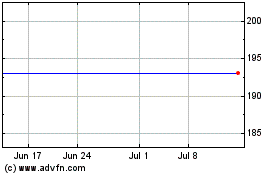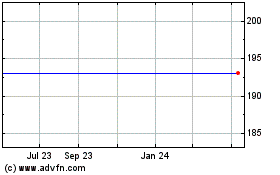By Laura Saunders
Pfizer Inc., the drug giant, has announced plans to merge with
Allergan PLC, a Dublin-based firm, in an "inversion" deal that is
expected to cut Pfizer's tax rate by about one-third. But investors
holding Pfizer shares could owe taxes due to the merger and may not
get cash payouts sufficient to cover the bill.
The deal is taxable to shareholders because Pfizer investors are
receiving a total of more than 50% of the stock of the foreign firm
Allergan, according to Robert Willens, an independent tax adviser
in New York. In such cases, the tax rules consider the swap of old
shares for new ones to be a taxable exchange.
As a result, shareholders holding Pfizer shares in a taxable
account, rather than a tax-sheltered retirement account such as an
IRA, 401(k), or 403(b) plan, will owe tax on the capital gains in
their shares.
For example, if an investor bought Pfizer at $10 a share and the
merger values the stock at $32 a share, the capital gain would be
$22.
Losses, however, won't be deductible, although few investors are
expected to have them. Instead, investors can take losses only if
they sell shares.
What will be the tax rate on gains? The top rate on long-term
gains--those held longer than a year--is 20%, but the rate for many
investors is 15%. A surtax of 3.8% also applies to singles with
adjusted gross income of more than $200,000 and married joint
filers with income of more than $250,000. So an income spike from
gains on Pfizer shares could trigger this surtax for investors with
much lower incomes.
For investors with income well below $100,000, the capital-gains
rate can be zero.
Pfizer has said it expects between $6 billion and $12 billion
from the merger will be paid out to shareholders, presumably to
help cover their tax bills. Shareholders will be able to elect to
receive cash instead of stock in the combined company for some or
all Pfizer shares. Depending on demand, the amount an investor
receives could be prorated.
Pfizer has just over six billion shares outstanding, but it
isn't clear how many investors would qualify for or elect the cash
payout. The company expects to complete the transaction in the
first half of 2016.
Dan Horton, a retired cardiologist who lives in Wisconsin, fears
that won't be enough to cover his taxes. He says that two-thirds of
his $65,000 investment in Pfizer, which he made in 1997, consists
of capital gains. "I think they don't care about individual
shareholders, just institutional ones--and they won't owe this
tax," he says.
If he (and other investors with taxable holdings) were able to
hold the shares until death, no capital-gains tax would be due.
"This is about creating value over the long term for our
shareholders," said Frank D'Amelio, Pfizer's Chief Financial
officer. He added that the firm is continuing a dividend payout
ratio of approximately 50% of adjusted earnings per share.
A spokeswoman for Pfizer said the company won't pay taxes
triggered by the deal for executives and directors.
Here are three tax-minimizing strategies for investors facing an
unwelcome tax bill from the Pfizer/Allergan merger.
Offset gains with losses. One way to reduce a capital-gains tax
bill is to offset gains with losses from the sales of other assets,
such as stock or real estate. Because unused losses can be carried
forward, some investors may have them from prior years.
It is also possible to sell underwater assets to harvest losses
that will offset gains. But investors shouldn't reacquire such
assets for at least 30 days, or the use of the loss will be
suspended.
Give shares to someone in a lower tax bracket. For Pfizer
shareholders who were planning to help a friend or relative, giving
Pfizer shares could be a smart move. Typically the recipient will
owe taxes when the deal is complete, but at a lower rate--and for
some the rate could be zero.
The rule is that any taxpayer can give an unlimited number of
recipients up to $14,000 each per year with no gift-tax due, and
one partner of a married couple can give $28,000 if the other
doesn't use this break.
But there are caveats: Experts say the gift must be made before
the merger is complete, such as before government approval or a
shareholder vote.
Another involves the "kiddie tax." Nearly all children under 18
and many under 24 owe tax on investment income above $2,100 at
their parents' rate, so take this rule into account when making
gifts.
Donate shares. Pfizer shareholders who are charitably inclined
should consider making their donations with appreciated shares.
One of the tax code's notable breaks allows donors a deduction
for the full market value of appreciated stock that is publicly
traded, up to 30% of adjusted gross income. (Leftover amounts can
be carried forward and used for up to five years.)
For example, if a Pfizer shareholder purchased shares for $2
each that are worth $32 each at the time of donation, the donor
owes no capital-gains tax and can deduct $32 per share.
Donors making large gifts, or who want to postpone designating
recipients, should consider the benefits of a "donor-advised fund."
Taxpayers who donate to them get a current deduction, but can delay
recommending recipients until later--at which point there is no
deduction. Meanwhile, the money can grow tax-free.
Many umbrella charitable groups offer donor-advised funds, as do
Fidelity Investments, Charles Schwab, and Vanguard group.
As with gifts to individuals, the caveat on timing applies--so
don't wait until the deal is done to make the gift.
Write to Laura Saunders at laura.saunders@wsj.com
(END) Dow Jones Newswires
November 23, 2015 16:42 ET (21:42 GMT)
Copyright (c) 2015 Dow Jones & Company, Inc.
Allergan (NYSE:AGN)
Historical Stock Chart
From Mar 2024 to Apr 2024

Allergan (NYSE:AGN)
Historical Stock Chart
From Apr 2023 to Apr 2024
